人教版(2019)必修第一册Welcome unit Listening and Speaking 课件(共30张PPT,内镶嵌音频)
文档属性
| 名称 | 人教版(2019)必修第一册Welcome unit Listening and Speaking 课件(共30张PPT,内镶嵌音频) | 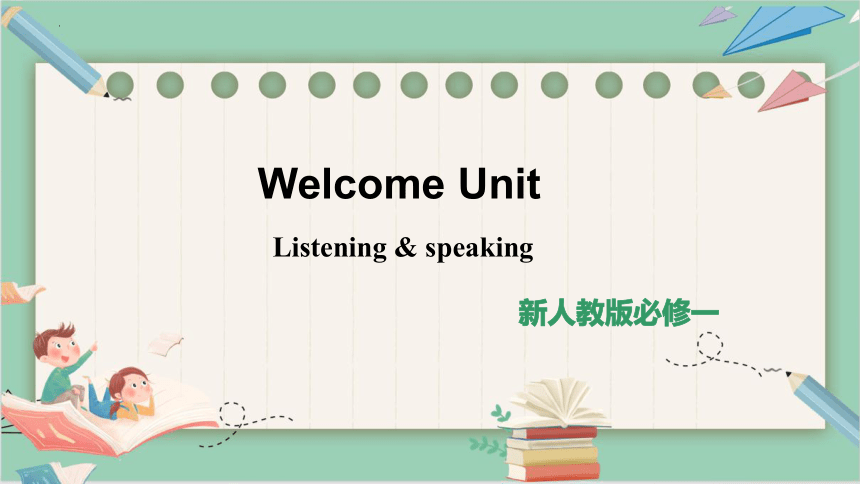 | |
| 格式 | pptx | ||
| 文件大小 | 8.8MB | ||
| 资源类型 | 教案 | ||
| 版本资源 | 人教版(2019) | ||
| 科目 | 英语 | ||
| 更新时间 | 2023-11-29 11:00:13 | ||
图片预览

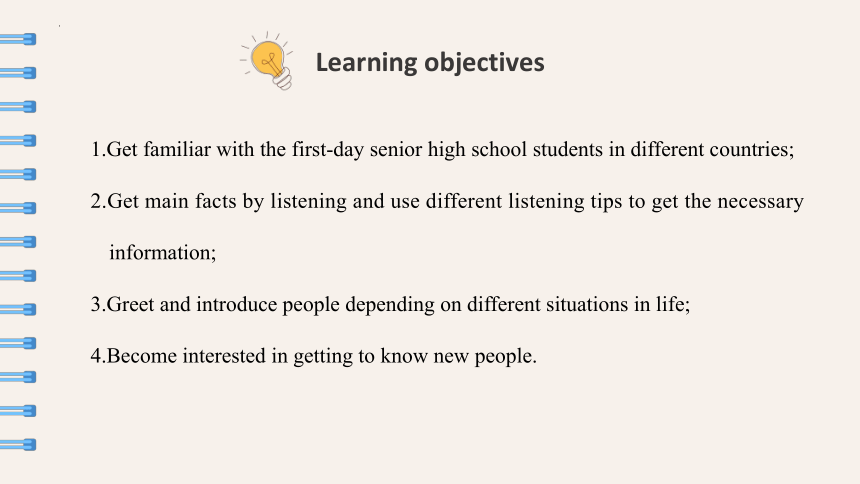

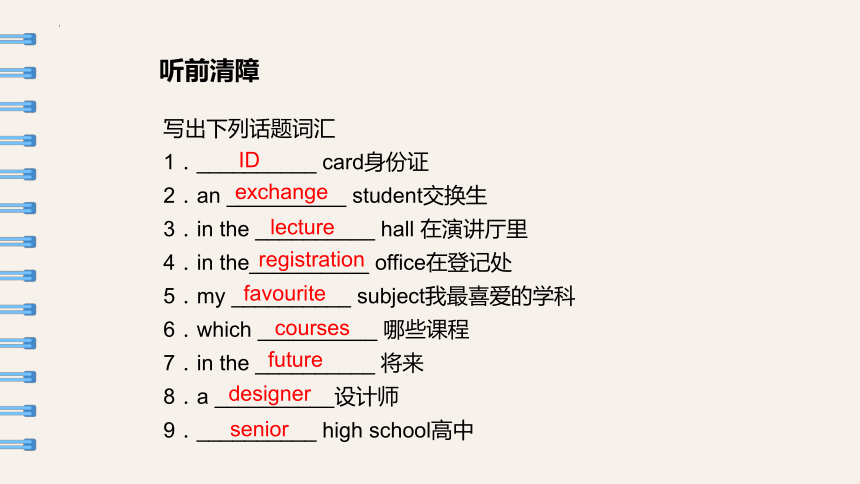
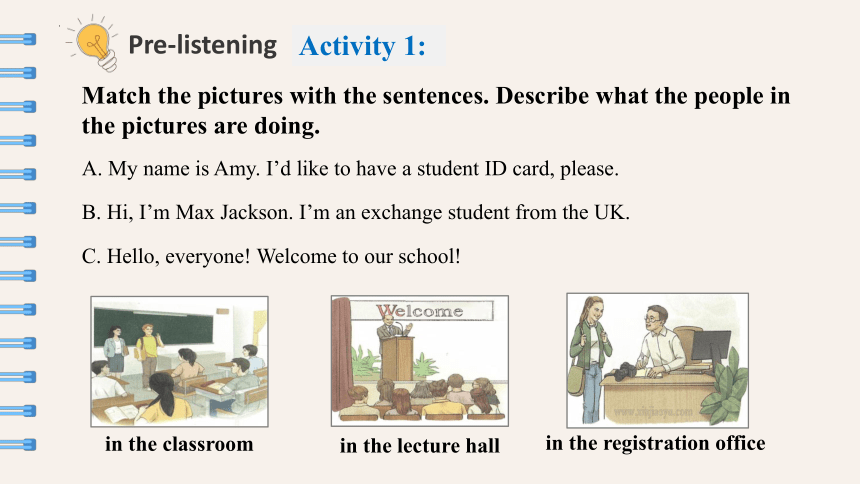
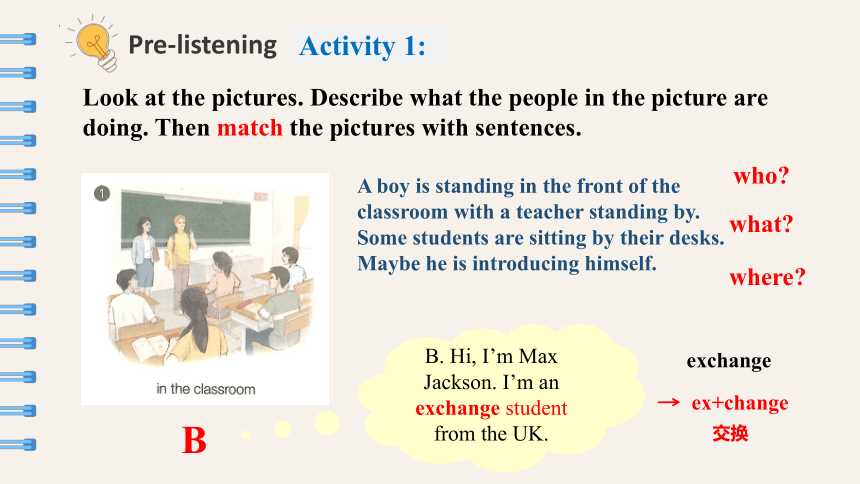
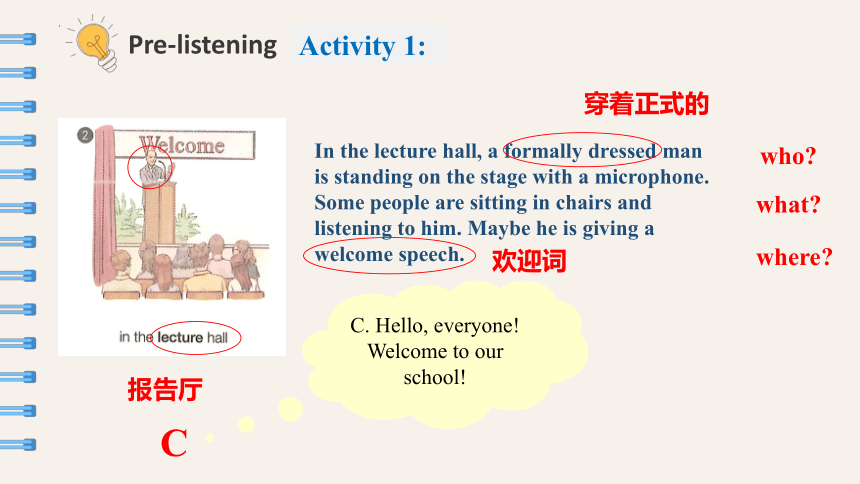
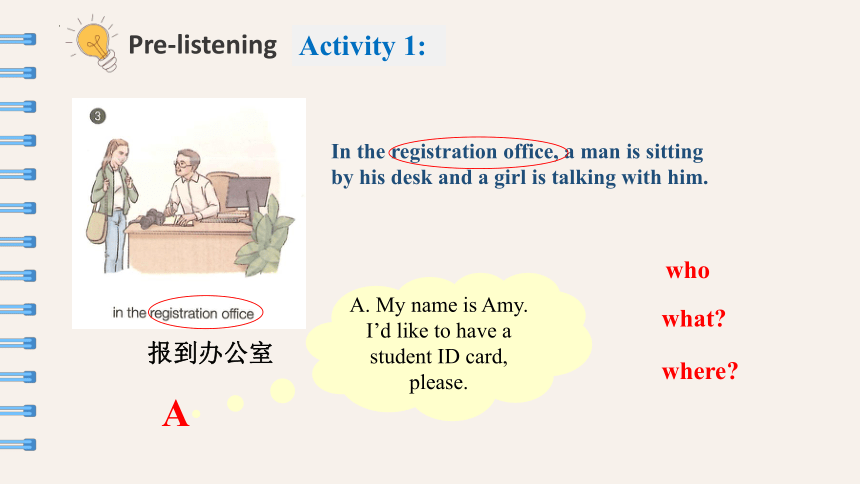
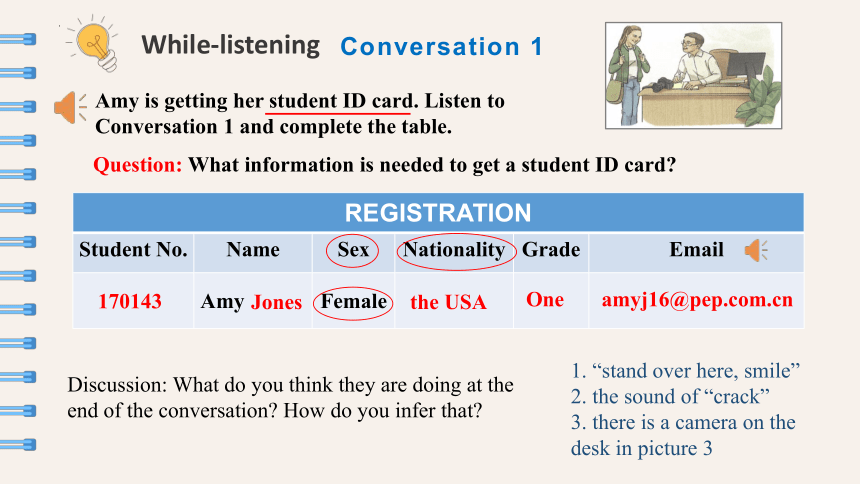
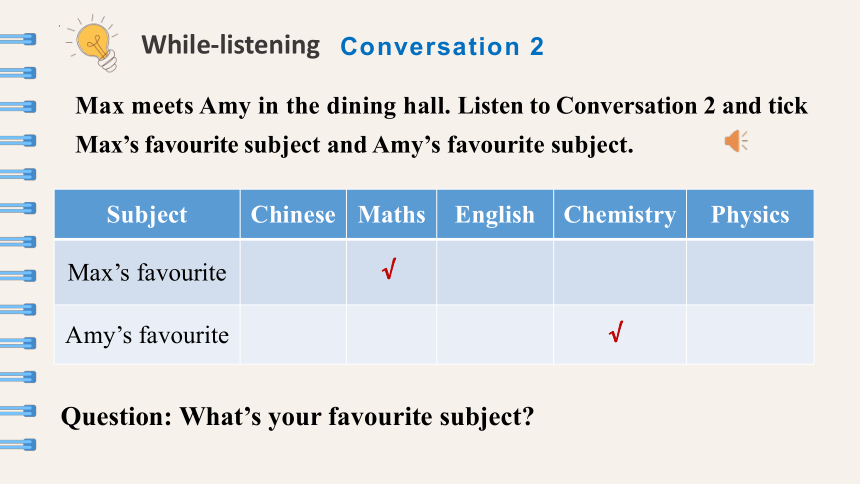
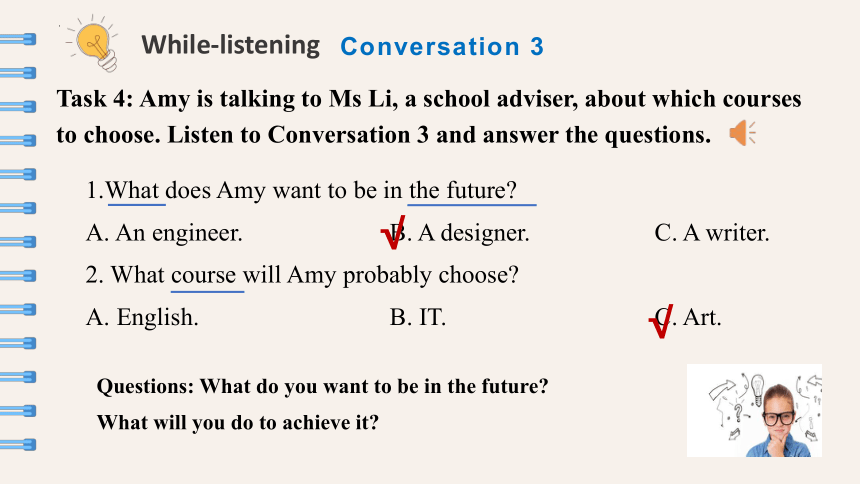
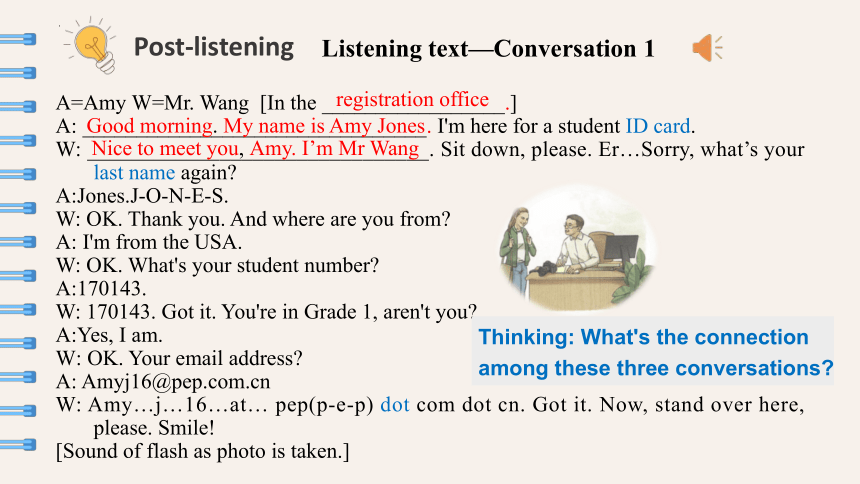
文档简介
(共30张PPT)
Listening & speaking
Welcome Unit
新人教版必修一
1.Get familiar with the first-day senior high school students in different countries;
2.Get main facts by listening and use different listening tips to get the necessary information;
3.Greet and introduce people depending on different situations in life;
4.Become interested in getting to know new people.
Learning objectives
Read the quote and translate it into Chinese. Who said it What does it mean
A thousand-mile journey begins with the first step.
Well begun is half done!
Lead-in
写出下列话题词汇
1.__________ card身份证
2.an __________ student交换生
3.in the __________ hall 在演讲厅里
4.in the__________ office在登记处
5.my __________ subject我最喜爱的学科
6.which __________ 哪些课程
7.in the __________ 将来
8.a __________设计师
9.__________ high school高中
ID
exchange
lecture
registration
favourite
courses
future
designer
senior
听前清障
Match the pictures with the sentences. Describe what the people in the pictures are doing.
A. My name is Amy. I’d like to have a student ID card, please.
B. Hi, I’m Max Jackson. I’m an exchange student from the UK.
C. Hello, everyone! Welcome to our school!
in the classroom
in the lecture hall
in the registration office
Activity 1:
Pre-listening
Look at the pictures. Describe what the people in the picture are doing. Then match the pictures with sentences.
who
what
where
A boy is standing in the front of the classroom with a teacher standing by. Some students are sitting by their desks. Maybe he is introducing himself.
B. Hi, I’m Max Jackson. I’m an exchange student from the UK.
ex+change
交换
exchange
B
Activity 1:
Pre-listening
In the lecture hall, a formally dressed man is standing on the stage with a microphone. Some people are sitting in chairs and listening to him. Maybe he is giving a welcome speech.
C. Hello, everyone! Welcome to our school!
who
what
where
报告厅
穿着正式的
C
欢迎词
Activity 1:
Pre-listening
In the registration office, a man is sitting by his desk and a girl is talking with him.
A. My name is Amy. I’d like to have a student ID card, please.
who
what
where
报到办公室
A
Activity 1:
Pre-listening
Conversation 1
Amy is getting her student ID card. Listen to Conversation 1 and complete the table.
REGISTRATION
Student No. Name Sex Nationality Grade Email
Amy Female
170143
Jones
the USA
One
amyj16@.cn
Discussion: What do you think they are doing at the end of the conversation How do you infer that
1. “stand over here, smile”
2. the sound of “crack”
3. there is a camera on the desk in picture 3
Question: What information is needed to get a student ID card
While-listening
Max meets Amy in the dining hall. Listen to Conversation 2 and tick Max’s favourite subject and Amy’s favourite subject.
Subject Chinese Maths English Chemistry Physics
Max’s favourite
Amy’s favourite
√
√
Question: What’s your favourite subject
Conversation 2
While-listening
Task 4: Amy is talking to Ms Li, a school adviser, about which courses to choose. Listen to Conversation 3 and answer the questions.
1.What does Amy want to be in the future
A. An engineer. B. A designer. C. A writer.
2. What course will Amy probably choose
A. English. B. IT. C. Art.
√
√
Questions: What do you want to be in the future What will you do to achieve it
Conversation 3
While-listening
A=Amy W=Mr. Wang [In the _________________.]
A: ________________________________. I'm here for a student ID card.
W: _______________________________. Sit down, please. Er…Sorry, what’s your last name again
A:Jones.J-O-N-E-S.
W: OK. Thank you. And where are you from
A: I'm from the USA.
W: OK. What's your student number
A:170143.
W: 170143. Got it. You're in Grade 1, aren't you
A:Yes, I am.
W: OK. Your email address
A: Amyj16@.cn
W: Amy…j…16…at… pep(p-e-p) dot com dot cn. Got it. Now, stand over here, please. Smile!
[Sound of flash as photo is taken.]
Listening text—Conversation 1
Good morning. My name is Amy Jones
registration office
Nice to meet you, Amy. I’m Mr Wang
Thinking: What's the connection among these three conversations
Post-listening
Listening text—Conversation 2
M=Max A=Amy
[In the _______________.]
M:____________________________
A:______________________________
M: I’m good. Let's go and sit down.
[They walk to a table.]
A: ____________________________ senior high school
M: ________________,Amy. I've had maths and English this morning. The maths class is getting more difficult but it's really interesting. It’s my favourite class so far. How about you
A: I think science is more fun. Chemistry is my favourite.
dining hall
Hi Amy! How’s it going
Great. How about you
What do you think about
So far, so good
Thinking: What's the connection among these three conversations
Morning, Amy. How are you doing
A=Amy L=Ms. Li
[In the ________________.]
A: ________________, Ms Li.
L: _______________________________
A:Very well,thank you. Ms Li, I want to be a designer in the future, so what courses do you think I should choose
L: Oh, interesting! Well, first of all, I think an art course would be helpful to you. And there are some other courses...
[Fade out]
Listening text—Conversation 3
Thinking: What's the connection among these three conversations
1.Amy gets student ID card in the registration office.
2.Amy discusses about the favorite subjects with Max in the dinning hall.
3.Amy asks for course advice from Ms Li in the adiviser's room
Good morning
adviser's room
Speaking
Choose one of the situations and make a conversation. Try to use the expressions on Page 3 of the textbook.
A boy meets his former classmates in the dining hall.
A boy meets his new classmates on campus.
A boy meets his new English teacher on campus.
Two Chinese teenagers meet a visiting group of exchange students from South Korea at the airport.
Group work
Discussion& Conclusion
Do you think conversation1,2,3 are formal talks or informal talks Why
Conversation1: Amy is getting
her student ID card
Conversation2: Max meets Amy
in the dining hall.
Conversation3: Amy is talking to
Ms Li, a school adviser...
informal
formal
formal
Good morning.
Nice to meet you.
Thank you.
Please.
Hi.
How's it going
Great!
How about you
I'm good.
So far, so good.
Good morning.
How are you doing
Very well, thank you.
A boy meets a girl during a break.
An exchange student is talking to a teacher on campus.
A boy and a girl are at the airport to meet a visiting group of teachers and students from England.
informal
formal
formal
Group work
introductions
Greetings
Responses
My name is ...
I’m ...
This is ...
Have you met...
Do you know ...
May I introduce ...
I’d like you to meet ...
I don’t believe you know ...
Hi/Hello!
Good morning!
What’s up
How’s it going
How are things going
How are you
How are you doing
Nice/Glad to meet you.
Hi/Hey!
Morning!
Not much.
Great!
I’m fine, and you
Very well, thank you.
How about you
Nice/Glad to meet you, too.
1. What’s up 出什么事了?/ 怎么了?
eg. 天气究竟怎么了?
What’s up with the weather
2. How’s it going 最近怎么样?
eg. —Hey, Gordon. How is it going
—Pretty good!
3. How are things going 近来情况如何?事情进展得怎么样?
How are things going with you recently 你最近怎么样?
What’s wrong/the matter with you
Language study
4. How are you VS How are you doing
这两句话都是”你好吗“的意思,但细节上略有区别。
“How are you ”的目的是直接询问对方的整体状态,”你身体好吗“,句子完整,是一个比较泛指的概念。
“How are you doing ”可以指各种具体的事情,略有所指,后可接各种事情的描述。
How are you doing with your failure in work
你经历工作的问题后,人还好吗
Sample conversation 1
Mike: Hi! My name is Mike.
Jenifer: Hey. I'm Jennifer.
Mike: Say, aren't you in Ms Sullivan's 10:00 English class
Jenifer: I sure am! I always sit at the front.
Mike: I thought I saw you there. Oh, class is about ready to start. Catch you later!
Jenifer: Catch you later!Bye!
Display conversation 2 &3
speak!
(informal )
Read and review 3 listening conversations and complete the chart. Write down as many sentences as you can.
Type Introductions Greetings Responses
Formal May I introduce... Nice to meet you. Nice to meet you,too.
... ... ...
Informal This is... What's up Not bad.
... ... ...
Homework
exchange vt. n. 交换;交流;交易;兑换
拼背法:ex恶心change嫦娥
八戒恶心了嫦娥,作为交换,被贬了!
词根词缀法:ex额外的+change改变=交换
教材原句 I’m an exchange student from the UK.(P2)
我是一名来自英国的交换生。
exchange和change作动词时,前者强调双方交换,而后者则强调事物的属性或位置的改变。
Language study
n. 交流,交换,互换,兑换
in exchange for sth. 作为交换
He offered to take care of the garden in exchange for staying in the house for free.
他愿意照料花园,条件是让他免费住在这栋房子里。
exchange student 交换生
vt. 交换,交流,兑换
exchange A for B 以A交换B;把A兑换成B
exchange sth. with sb. 与某人交流、交换某物
exchange opinions/ideas/views/news/information
Before graduation, students exchange presents with classmates.
make an exchange
前缀ex-的意义
(1) ex-=out,outside, extra,表示“出,向外,额外的”,表示加强意义。
如:exit(出口),exclaim(呼喊)。
ex-的本义是“出,向外”,引申出“额外的”,然后是“加强意义”,即在语言流传的过程中逐渐失去了意义。
(2) ex-=former 以前的(可与许多名词结合),
如:ex-wife(前妻),ex-president(前总统),
ex-“以前的”引申自“现在范围之外(out)”。这个义项构词比较稳定,意义明确。
lecture n. 讲座,讲课;教训 vi. (开)讲座;讲课 vt.训斥
n. (尤指大学里)讲座,讲课,演讲
仿声记忆法: ”莱克彻“(音同:lecture)
莱克彻举办了“讲座”
attend/go to a lecture 参加一个讲座
give/deliver a lecture 作一个讲座
hold a lecture 举办一个讲座
We will attend a lecture on e-sports tomorrow.
我们明天将要参加一个关于电竞的讲座。
vi.(尤对大学生)讲授,讲课,作讲座;演讲
lecture on /in... 讲授、演讲
vt. 教训,训斥;说教
The teacher lectured pupils who didn’t finish their homework.
老师责备那些没完成家庭作业的学生。
register vi. vt. 记录,登记,注册
拼背法:reg热狗+is是+t他 热狗是他已被注册!
词根词缀法:regist 注册
vt. register a birth/marriage/death/company
registration n.登记,注册,挂号
tion 名词后缀
registration office 登记处,报到处
registration fees
注册费、报名费
nationality 国籍;民族
nation 国家;民族;国民
拼背法:na 哪 tion名词后缀 哪个国家
词根词缀法:nation国家+ality 名词后缀
personality n. 人格,个性(person人)
hospitality n. 好客,(hospit客人)
ality 表名词, 状态, 性质
country
nation
state
coutry 侧重指“疆土”
China is a large country.
nation 侧重指“人民,民族”
The president has the support of the whole nation.
state 侧重指“政体,政权”
European Union member states. 欧盟成员国
design
de前缀:离开;出 :deport(驱逐出境)deduce(推断)
词根词缀法:de出+sign标志 出标志的过程叫做设计。
n.设计,设计方案;vt.设计,筹划
n. 设计,图案,构思,打算,意图
make designs for 为···做设计
by design = on purpose 故意地
by accident/ by chance 偶然地
vt. 设计,构思,意欲,计划
design sth. for...为...设计某物
vt. [ 一般用被动语态] (为特点目的)计划,设计
be designed for sth./sb. 为某事/某人而设计
be designed to do 旨在做... 用于做...意欲做某事,目的是做某事
语境巧练
(1) The exercises are designed to strengthen (strengthen) your stomach muscles.
(2) 你认为这场车祸是人为故意还是偶然意外?
【语境串记】
I like the design of the suit, which was designed by a famous designer.
我喜欢这套西装的设计,它是由一位著名的设计师设计的。
(3)My desire is to work in a local computer company as a programme designer (design).
Do you think the traffic accident was caused by accident or by design
Listening & speaking
Welcome Unit
新人教版必修一
1.Get familiar with the first-day senior high school students in different countries;
2.Get main facts by listening and use different listening tips to get the necessary information;
3.Greet and introduce people depending on different situations in life;
4.Become interested in getting to know new people.
Learning objectives
Read the quote and translate it into Chinese. Who said it What does it mean
A thousand-mile journey begins with the first step.
Well begun is half done!
Lead-in
写出下列话题词汇
1.__________ card身份证
2.an __________ student交换生
3.in the __________ hall 在演讲厅里
4.in the__________ office在登记处
5.my __________ subject我最喜爱的学科
6.which __________ 哪些课程
7.in the __________ 将来
8.a __________设计师
9.__________ high school高中
ID
exchange
lecture
registration
favourite
courses
future
designer
senior
听前清障
Match the pictures with the sentences. Describe what the people in the pictures are doing.
A. My name is Amy. I’d like to have a student ID card, please.
B. Hi, I’m Max Jackson. I’m an exchange student from the UK.
C. Hello, everyone! Welcome to our school!
in the classroom
in the lecture hall
in the registration office
Activity 1:
Pre-listening
Look at the pictures. Describe what the people in the picture are doing. Then match the pictures with sentences.
who
what
where
A boy is standing in the front of the classroom with a teacher standing by. Some students are sitting by their desks. Maybe he is introducing himself.
B. Hi, I’m Max Jackson. I’m an exchange student from the UK.
ex+change
交换
exchange
B
Activity 1:
Pre-listening
In the lecture hall, a formally dressed man is standing on the stage with a microphone. Some people are sitting in chairs and listening to him. Maybe he is giving a welcome speech.
C. Hello, everyone! Welcome to our school!
who
what
where
报告厅
穿着正式的
C
欢迎词
Activity 1:
Pre-listening
In the registration office, a man is sitting by his desk and a girl is talking with him.
A. My name is Amy. I’d like to have a student ID card, please.
who
what
where
报到办公室
A
Activity 1:
Pre-listening
Conversation 1
Amy is getting her student ID card. Listen to Conversation 1 and complete the table.
REGISTRATION
Student No. Name Sex Nationality Grade Email
Amy Female
170143
Jones
the USA
One
amyj16@.cn
Discussion: What do you think they are doing at the end of the conversation How do you infer that
1. “stand over here, smile”
2. the sound of “crack”
3. there is a camera on the desk in picture 3
Question: What information is needed to get a student ID card
While-listening
Max meets Amy in the dining hall. Listen to Conversation 2 and tick Max’s favourite subject and Amy’s favourite subject.
Subject Chinese Maths English Chemistry Physics
Max’s favourite
Amy’s favourite
√
√
Question: What’s your favourite subject
Conversation 2
While-listening
Task 4: Amy is talking to Ms Li, a school adviser, about which courses to choose. Listen to Conversation 3 and answer the questions.
1.What does Amy want to be in the future
A. An engineer. B. A designer. C. A writer.
2. What course will Amy probably choose
A. English. B. IT. C. Art.
√
√
Questions: What do you want to be in the future What will you do to achieve it
Conversation 3
While-listening
A=Amy W=Mr. Wang [In the _________________.]
A: ________________________________. I'm here for a student ID card.
W: _______________________________. Sit down, please. Er…Sorry, what’s your last name again
A:Jones.J-O-N-E-S.
W: OK. Thank you. And where are you from
A: I'm from the USA.
W: OK. What's your student number
A:170143.
W: 170143. Got it. You're in Grade 1, aren't you
A:Yes, I am.
W: OK. Your email address
A: Amyj16@.cn
W: Amy…j…16…at… pep(p-e-p) dot com dot cn. Got it. Now, stand over here, please. Smile!
[Sound of flash as photo is taken.]
Listening text—Conversation 1
Good morning. My name is Amy Jones
registration office
Nice to meet you, Amy. I’m Mr Wang
Thinking: What's the connection among these three conversations
Post-listening
Listening text—Conversation 2
M=Max A=Amy
[In the _______________.]
M:____________________________
A:______________________________
M: I’m good. Let's go and sit down.
[They walk to a table.]
A: ____________________________ senior high school
M: ________________,Amy. I've had maths and English this morning. The maths class is getting more difficult but it's really interesting. It’s my favourite class so far. How about you
A: I think science is more fun. Chemistry is my favourite.
dining hall
Hi Amy! How’s it going
Great. How about you
What do you think about
So far, so good
Thinking: What's the connection among these three conversations
Morning, Amy. How are you doing
A=Amy L=Ms. Li
[In the ________________.]
A: ________________, Ms Li.
L: _______________________________
A:Very well,thank you. Ms Li, I want to be a designer in the future, so what courses do you think I should choose
L: Oh, interesting! Well, first of all, I think an art course would be helpful to you. And there are some other courses...
[Fade out]
Listening text—Conversation 3
Thinking: What's the connection among these three conversations
1.Amy gets student ID card in the registration office.
2.Amy discusses about the favorite subjects with Max in the dinning hall.
3.Amy asks for course advice from Ms Li in the adiviser's room
Good morning
adviser's room
Speaking
Choose one of the situations and make a conversation. Try to use the expressions on Page 3 of the textbook.
A boy meets his former classmates in the dining hall.
A boy meets his new classmates on campus.
A boy meets his new English teacher on campus.
Two Chinese teenagers meet a visiting group of exchange students from South Korea at the airport.
Group work
Discussion& Conclusion
Do you think conversation1,2,3 are formal talks or informal talks Why
Conversation1: Amy is getting
her student ID card
Conversation2: Max meets Amy
in the dining hall.
Conversation3: Amy is talking to
Ms Li, a school adviser...
informal
formal
formal
Good morning.
Nice to meet you.
Thank you.
Please.
Hi.
How's it going
Great!
How about you
I'm good.
So far, so good.
Good morning.
How are you doing
Very well, thank you.
A boy meets a girl during a break.
An exchange student is talking to a teacher on campus.
A boy and a girl are at the airport to meet a visiting group of teachers and students from England.
informal
formal
formal
Group work
introductions
Greetings
Responses
My name is ...
I’m ...
This is ...
Have you met...
Do you know ...
May I introduce ...
I’d like you to meet ...
I don’t believe you know ...
Hi/Hello!
Good morning!
What’s up
How’s it going
How are things going
How are you
How are you doing
Nice/Glad to meet you.
Hi/Hey!
Morning!
Not much.
Great!
I’m fine, and you
Very well, thank you.
How about you
Nice/Glad to meet you, too.
1. What’s up 出什么事了?/ 怎么了?
eg. 天气究竟怎么了?
What’s up with the weather
2. How’s it going 最近怎么样?
eg. —Hey, Gordon. How is it going
—Pretty good!
3. How are things going 近来情况如何?事情进展得怎么样?
How are things going with you recently 你最近怎么样?
What’s wrong/the matter with you
Language study
4. How are you VS How are you doing
这两句话都是”你好吗“的意思,但细节上略有区别。
“How are you ”的目的是直接询问对方的整体状态,”你身体好吗“,句子完整,是一个比较泛指的概念。
“How are you doing ”可以指各种具体的事情,略有所指,后可接各种事情的描述。
How are you doing with your failure in work
你经历工作的问题后,人还好吗
Sample conversation 1
Mike: Hi! My name is Mike.
Jenifer: Hey. I'm Jennifer.
Mike: Say, aren't you in Ms Sullivan's 10:00 English class
Jenifer: I sure am! I always sit at the front.
Mike: I thought I saw you there. Oh, class is about ready to start. Catch you later!
Jenifer: Catch you later!Bye!
Display conversation 2 &3
speak!
(informal )
Read and review 3 listening conversations and complete the chart. Write down as many sentences as you can.
Type Introductions Greetings Responses
Formal May I introduce... Nice to meet you. Nice to meet you,too.
... ... ...
Informal This is... What's up Not bad.
... ... ...
Homework
exchange vt. n. 交换;交流;交易;兑换
拼背法:ex恶心change嫦娥
八戒恶心了嫦娥,作为交换,被贬了!
词根词缀法:ex额外的+change改变=交换
教材原句 I’m an exchange student from the UK.(P2)
我是一名来自英国的交换生。
exchange和change作动词时,前者强调双方交换,而后者则强调事物的属性或位置的改变。
Language study
n. 交流,交换,互换,兑换
in exchange for sth. 作为交换
He offered to take care of the garden in exchange for staying in the house for free.
他愿意照料花园,条件是让他免费住在这栋房子里。
exchange student 交换生
vt. 交换,交流,兑换
exchange A for B 以A交换B;把A兑换成B
exchange sth. with sb. 与某人交流、交换某物
exchange opinions/ideas/views/news/information
Before graduation, students exchange presents with classmates.
make an exchange
前缀ex-的意义
(1) ex-=out,outside, extra,表示“出,向外,额外的”,表示加强意义。
如:exit(出口),exclaim(呼喊)。
ex-的本义是“出,向外”,引申出“额外的”,然后是“加强意义”,即在语言流传的过程中逐渐失去了意义。
(2) ex-=former 以前的(可与许多名词结合),
如:ex-wife(前妻),ex-president(前总统),
ex-“以前的”引申自“现在范围之外(out)”。这个义项构词比较稳定,意义明确。
lecture n. 讲座,讲课;教训 vi. (开)讲座;讲课 vt.训斥
n. (尤指大学里)讲座,讲课,演讲
仿声记忆法: ”莱克彻“(音同:lecture)
莱克彻举办了“讲座”
attend/go to a lecture 参加一个讲座
give/deliver a lecture 作一个讲座
hold a lecture 举办一个讲座
We will attend a lecture on e-sports tomorrow.
我们明天将要参加一个关于电竞的讲座。
vi.(尤对大学生)讲授,讲课,作讲座;演讲
lecture on /in... 讲授、演讲
vt. 教训,训斥;说教
The teacher lectured pupils who didn’t finish their homework.
老师责备那些没完成家庭作业的学生。
register vi. vt. 记录,登记,注册
拼背法:reg热狗+is是+t他 热狗是他已被注册!
词根词缀法:regist 注册
vt. register a birth/marriage/death/company
registration n.登记,注册,挂号
tion 名词后缀
registration office 登记处,报到处
registration fees
注册费、报名费
nationality 国籍;民族
nation 国家;民族;国民
拼背法:na 哪 tion名词后缀 哪个国家
词根词缀法:nation国家+ality 名词后缀
personality n. 人格,个性(person人)
hospitality n. 好客,(hospit客人)
ality 表名词, 状态, 性质
country
nation
state
coutry 侧重指“疆土”
China is a large country.
nation 侧重指“人民,民族”
The president has the support of the whole nation.
state 侧重指“政体,政权”
European Union member states. 欧盟成员国
design
de前缀:离开;出 :deport(驱逐出境)deduce(推断)
词根词缀法:de出+sign标志 出标志的过程叫做设计。
n.设计,设计方案;vt.设计,筹划
n. 设计,图案,构思,打算,意图
make designs for 为···做设计
by design = on purpose 故意地
by accident/ by chance 偶然地
vt. 设计,构思,意欲,计划
design sth. for...为...设计某物
vt. [ 一般用被动语态] (为特点目的)计划,设计
be designed for sth./sb. 为某事/某人而设计
be designed to do 旨在做... 用于做...意欲做某事,目的是做某事
语境巧练
(1) The exercises are designed to strengthen (strengthen) your stomach muscles.
(2) 你认为这场车祸是人为故意还是偶然意外?
【语境串记】
I like the design of the suit, which was designed by a famous designer.
我喜欢这套西装的设计,它是由一位著名的设计师设计的。
(3)My desire is to work in a local computer company as a programme designer (design).
Do you think the traffic accident was caused by accident or by design
